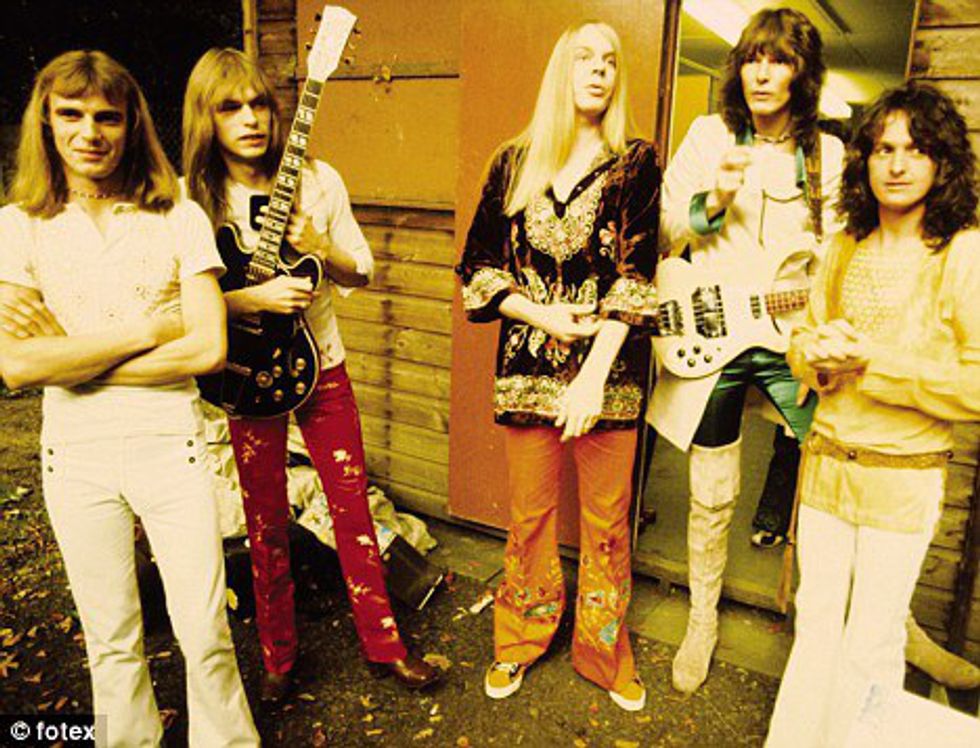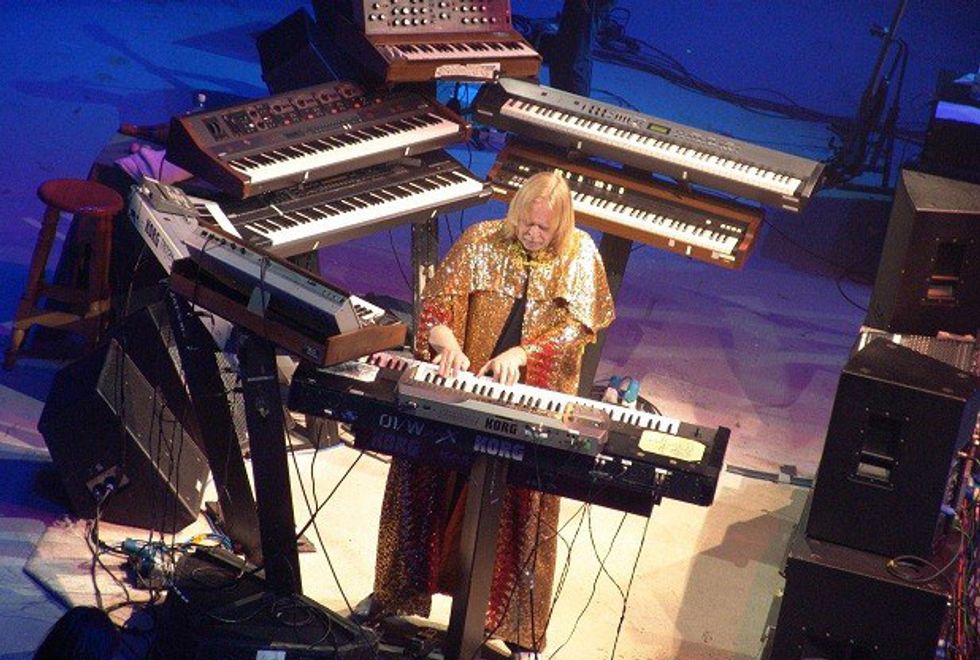Background
After the release of their highly acclaimed 1972 album Close to the Edge, Yes was about to embark on the album's supporting tour until the group received startling news. Drummer Bill Bruford announced he was leaving the group to join another progressive rock band, King Crimson, due to personality clashes and creative differences. The band quickly recruited Alan White to replace Bruford and the tour went off without a hitch. During the tour, lead vocalist Jon Anderson began reading Autobiography of a Yogi by Indian guru Paramahansa Yogananda and one of the book's footnotes referring to the shastras (the four bodies of Hindu texts) caught his eye. He and guitarist Steve Howe would begin writing lyrics based on Anderson's interpretation of the footnote.
After the tour, the band convened at Morgan Studios in London to rehearse and compose music to Anderson and Howe's lyrics. All band members were excited about the four song movements centered around the shastras, except for keyboardist Rick Wakeman. Wakeman's issue was that the band had way too much material for a single album, yet not enough for a double album, which would result in a lot of musical padding. His concern became reality as all four songs averaged to about 20 minutes per song. The meaning and music behind those songs resulted in one of progressive rock's most definitive masterpieces.
The Revealing Science of God (Dance of the Dawn)
The opening track of the album begins with natural sounds of waves crashing on the shore of the ocean with atmospheric accompaniment from guitarist Steve Howe, then transitions to 20 minutes of what it means to continually seek for and discover a higher power (in this case, God). The songs experiences a multitude of time signatures and recurring musical themes acting as the more "commercial or easy-listening side" of the album according to Howe. "Past present movers moments we'll process the future, but only through Him we know...You seekers of the truth accepting that reason will relive and breathe and hope and chase and love for you and you and you" sung by Jon Anderson as the final lyrics sums up the moral perfectly. We can have expectations of what our lives may become, yet God, ultimately, has the master plan and only through Him can we know what lies in store for us. Seek all we want for love and hope, yet there is only one deity that can provide both perfectly.
The Remembering (High the Memory)
"The Remembering" provides a lighter, folky side of Yes. The first eight and a half minutes provides music that echoes the sounds of the ocean with rhythms, eddies, swells, and undercurrents ("a calm sea of music" according to Anderson). The keyboards played by Wakeman add another dimension to the song and is considered among the best of his contributions to the band's music. At around the nine minute point, the song begins to pick up tempo and steam from Howe's acoustic guitar as the intensity builds. Musical themes reoccur as well on this track and Wakeman's keyboard solo towards the end is hauntingly brilliant (it will definitely give listeners goosebumps). 20 minutes of pure Yes magic as we better understand the importance of memories!
The Ancient (Giants Under the Sun)
As the most bipolar musically sounding track on the album, "The Ancient" begins with the sound of a gong followed various percussion, then transitioning into chaotic, electronic mayhem with keyboards, guitars, drums, and bass. About halfway into the 19 minute track, the music begins to calm and more acoustic simplicity slips in highlighted by Howe's acoustic guitar. According to Anderson, "The Ancient" is about reflections on the beauties and treasures of lost civilizations. The acoustic guitar laced section of the song is definitely one of the more soothing aspects of the otherwise musically complex album.
Ritual (Nous Sommes du Soleil)
The final track, "Ritual," is, perhaps, the best song on the album. Howe's guitar solo at the beginning of the track is spine-chilling and one of his best with Yes. Beautiful melodies sung by Jon Anderson with harmony accompaniment from bassist Chris Squire helps drive this album home. The latter part of the song is highlighted with bass and drum solos meant to signify the fight and struggle between "sources of evil and pure love" according to Anderson. The final section is musically simplistic with Anderson on guitar and Rick Wakeman on piano, which, by far, is the most beautiful sounding part of the album.
Rick Wakeman Fallout
Despite the album coming together magnificently, Rick Wakeman was displeased with the musical direction the band took with Tales. He said there were definitely wonderful musical moments on the album, but felt the musical padding was awful. During the recording sessions, Wakeman spent a majority of his off-time either playing darts or at a local pub drinking more than usual. His relationship with the band worsened during the subsequent tour due to his boredom playing the entirety of the album at each show, which led him to eat an order of curry onstage during one of the album numbers at a show in Manchester. He decided to leave the band after the tour and would not rejoin Yes until 1977.
What Critics Said About the Album
Upon release in December 1973, the album polarized critics and fans alike. Some praised the album for its uniqueness and musical passages, while others criticized it for its length and questionable choices for musical padding. Rock journalist Chris Welch of Melody Maker wrote: "It is a fragmented masterpiece, assembled with loving care and long hours in the studio. Brilliant in patches, but often taking far too long to make its various points, and curiously lacking in warmth or personal expression." On a more positive note, Bruce Eder of AllMusic said the album contains "some of the most sublimely beautiful musical passages ever to come from the group, and develops a major chunk of that music in depth and degrees in ways that one can only marvel at, though there's a big leap from marvel to enjoy. If one can grab onto it, Tales is a long, sometimes glorious musical ride across landscapes strange and wonderful, thick with enticing musical textures." Yes fans to this day remain divided on the impact Tales had in the group's music and in progressive rock itself.
What I Say About the Album
Personally, after listening to the album for the first time, I only considered "The Revealing Science of God" and "Ritual" to be the only good tracks. After many subsequent listens, however, I began to understand the brilliance behind "The Remembering" and "The Ancient," despite its musical padding at times. Close to the Edge is, by far, my favorite Yes album, but Tales is close behind in my top five favorite Yes albums. I may not understand the entire meaning behind Anderson and Howe's lyrics, but the overall messages resonate. I highly encourage everyone to listen to this album in its entirety at least once, especially if you are a music lover or even a music student since the musical passages within this work provide a great study into theory and complexity!






















